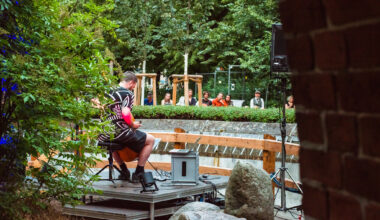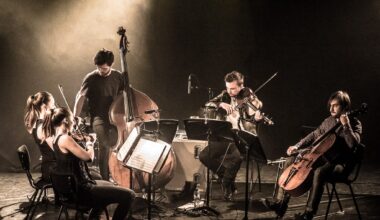Olec Mün presents «Vögel» (Birds), his brand new piano album, set for release on June 24th, 2021. Mostly composed during the first lockdown, from March to August 2020, it is an album inspired by the sense of freedom that birds represent. «Vögel» is an album containing tranquility and intimacy: all its melodies draw elegant, minimal melodic shapes, just like a flock of birds.
To explain the German title, the artist underlines that “this album comes after my LP «Reconciliation», through which I made peace with my Jewish family history, and consequently with Germany and German language. Two years ago I could have never imagined I could be able to give an album a title in German, but now after making this process it somehow sounds natural.”
FACTS
1. “We don’t see things as they are; we see them as we are” – The Talmud
2. “Most people use statistics like a drunk man uses a lamppost; more for support than illumination” – Andrew Lang
3. “Competition is the law of the jungle, but cooperation is the law of civilization” – Peter Kropotkin
QUESTIONS
1. What is the biggest inspiration for your music?
Silence. All the music I make comes from silence. It is when I find silence that music emerges, the rest is only noise that compulsively fills space afraid of what silence might bring. Real silence is intimidating and so difficult to achieve. It does not have to do necessarily with the absence of noise. You can perceive silence while listening to music. The silence that inspires my music is one that transcends the duality between sound and the absence of it.
2. How and when did you get into making music?
My mother, being a music therapist, has taught me how to rely on music as a constant tool to connect, express, communicate, so for me making music is very close to the act of talking or breathing. Making music was an everyday game for me since the very beginning.
I made my first song when I was about 5. Can’t remember anything about it, only that it talked about ecology and saving the planet, (probably influenced by Michael Jackson’s “Heal the World”). The song was clearly not successful because the world is much more destroyed today than it was thirty years ago. Nevertheless I continued making music until today, and I hope to go on until my last day on Earth.
3. What are 5 of your favourite albums of all time?
These titles are not fixed. If you ask me tomorrow maybe the list is different: The Melody at night, with you. Keith Jarrett; Undercurrent. Bill Evans and Jim Hall; A Love Supreme. John Coltrane; Happy Ending. Terry Riley; Summit. Gerry Mulligan and Astor Piazzolla
4. What do you associate with Berlin?
I have family there, so I think about them when I think of Berlin.
An atmosphere of people in search of authentic art, a vibrant city, full of life and creativity.
I can not avoid associating it with the war and the wall, since that story touches me personally. I also think that the beautiful Berlin we see nowadays is a consequence of those times. Cities, like people and seasons, have époques of contraction and expansion.
5. What’s your favourite place in your town?
That is a difficult question because I feel I have no town today. Ever since I left my hometown in Buenos Aires, I have been moving a lot, finding favourite places in every town I go to. Every place has a special spot that attracts me like a magnet. Today I live near the beach in Barcelona, so sitting on a bench watching the horizon is my favourite spot. I usually take a coffee or a “mate” and sit there admiring how the sea and the sky meet in a perfect straight line.
6. If there was no music in the world, what would you do instead?
I wouldn’t want to live in that world! But if I had to, I guess I would write poems and stories instead. I would also be obsessed in finding that thing that unites us all, that thing that would elevate our frequency and remind us that we are Souls having an experience in a body. I would be obsessed with discovering music.
7. What was the last record/music you bought?
Last year I was in Vienna and I entered an old vinyl shop. I stayed there for a couple of hours listening to gorgeous music. I ended up buying a vinyl as a present to a friend. Can’t remember exactly what it was but I remember it was funky because I had to start dancing at the record shop.
8. Who would you most like to collaborate with?
Nils Frahm.
9. What was your best gig (as performer or spectator)?
I was a teenager when I went to an Hermeto Pascoal concert. Hermeto is a Brazilian being that when you see him and listen to his music, you would suspect he is from outer space. That night, he played the piano, the flute, he sang and danced, and made us all sing like a choir. I remember having the sensation I was not in a concert but in a ceremony. Something in me clicked that day, and only today I know what it was: I wanted to dedicate my life to music.
10. How important is technology to your creative process?
There are two aspects to my creative process. When I compose with the piano alone I make sure there is no technology around. I take it as a ritual of presence without the distraction of screens.
There is another aspect of my creative process which I love, that is using synthesisers and effects, and in that area technology plays a vital role. I must admit I am not good with technology and I find that this is somehow beneficial for my creative process, because ideas may come from mistakes I make, or sudden and random sounds, textures and rhythms arise and I have no idea how it happens.
Once I shared in my Instagram account a picture of a recording studio where I was producing and recording my first album, “Septenio”. The picture was of me surrounded by around 50 synthesisers. A friend of mine, who is a percussionist, commented: “¿What happens if there is a power cut?” That mere comment kept me thinking about this dependency we sometimes have with gear and technology. That’s why I always try to have an acoustic instrument with me that I can take to the middle of nowhere and still make music.
As a final thought, defining technology is rather difficult. A piano or a guitar are also technology but we don’t usually look at them as such. At one moment in history, these instruments were great advances in technology although it now seems they were always here. So at the end of the day, every time you are using any tools in whatever you are doing, be it plugged or unplugged, modern or old, you are using technology.
11. Do you have siblings and how do they feel about your career/art?
I have three brothers whom I love with all my heart. They are also my friends and they are all musicians as well. They are really supportive of my path, and they are the main witnesses (apart from my parents) of my whole process of becoming what I am today. I have learned a lot of music together with them, listening to records, talking about music and most significantly, making music together.I feel they are present every time I am composing and playing. I take them with me through my music.
Photo © Paloma Arbol


